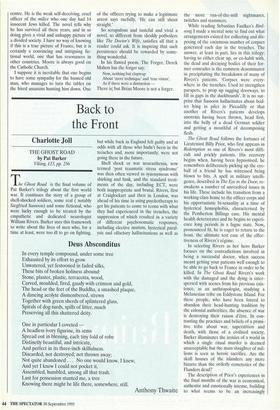Vision and revision
James Simmons
THE STATEMENT by Brian Moore Bloomsbury, £14.99, pp. 217 Ihave been reading and reviewing Brian Moore's work for 25 years, though I have missed some of the more recent novels. He is one of the literary successes of modern Ulster. In my first long essay, 'The Limita- tions of Realism', I considered the first half dozen novels and decided that despite interesting subjects and great variety he seemed to have no vision, just the energy to turn out believable stories, nearly always with something ingenious or memorable, but nothing to cling to or live by.
This new novel is remarkably solid and daring. It deals with an old French war criminal on the run and those who are chasing him, hired assassins, the military, reformists in the Catholic Church (an insti- tution which has given him support and shelter). It aspires to create a large picture of modern France since the Vichy regime, and makes a very complex and believable job of it.
Chapter after chapter introduces new characters, enriching rather than confusing the tapestry. This is a fiction writer at the height of his powers risking complexity of numbers and views because he knows he can tie the ends together. Every local detail, the look and smell of things is just right. This is a thriller in its fast-moving uncluttered scenes, the suspense and the violence, but it is also an historical novel.
The large cast of characters is economi- cally sketched from the Italian female judge to the ex-wife of Brossard, to the assassins who appear only to fail and die. All we need is their connection • to Brossard, their part in the struggle either to clean up the country, the corruption that protects Brossard, or the conservative struggle to recover the Mass in Latin and the old France without blacks and Jews. Various clergy and retired police officers reiterate that the real winners of the second world war were the Jews and the Communists. Towards the end, many of them begin to have believable doubts about the prejudices that have led them into hiding a killer.
Brossard himself doesn't have to be seen in depth, though it is a subtle and complete portrait. What he did is at the novel's centre. He is the weak self-deceiving, cruel officer of the milice who one day had 14 innocent Jews killed. The novel tells why he has survived all these years, and in so doing gives a vivid and unhappy picture of a divided society. I have no way of knowing if this is a true picture of France, but it is certainly a convincing and intriguing fic- tional world, one that has resonances in other countries. Moore is always good on the Catholic Church.
I suppose it is inevitable that one begins to have some sympathy for the hunted old man, who manages to turn the tables on the hired assassins hunting him down. One of the officers trying to make a legitimate arrest says ruefully, 'He can still shoot straight.'
So scrupulous and tasteful and vivid a novel, so different from shoddy potboilers like The Doctor's Wife, satisfies all that a reader could ask. It is inspiring that such persistence should be rewarded by some- thing wonderful.
In his flawed poem, The Forger, Derek Mahon has the forger say:
Now, nothing but claptrap
About 'mere technique' and 'true vision', As if there were a distinction -
There is; but Brian Moore is not a forger.



































































 Previous page
Previous page